The Hansen Clinic of Natural Medicine is leading the way in providing the latest and most advanced therapies in Natural and Regenerative Medicine. Dr. Hansen specializes in Bio-Identical Hormones and Cellular Therapy, with the goal of providing your body with the biologic ingredients you need to supplement, restore, reconstruct or replace deficient hormones, or damaged and worn out tissues and cells so that your body can rejuvenate and heal itself.
You’re only given one body and one life to live, so why live plagued by a cycle of pain, medication side-effects and treatments that fail to correct the true underlying cause of your illness or pain?
Dr. Hansen believes that Cellular Therapy is the greatest and most significant medical advancement ever discovered. Mesenchymal Stem Cells (MSCs), also known as Mesenchymal Stromal Cells, are made by the body to heal any type of damage. MSCs are multi-potent cells that have the ability to divide indefinitely and change into any type of cell that the body needs to supplement, restore, reconstruct or replace and enable your body to regenerate so you can achieve your optimal health and ultimate potential.
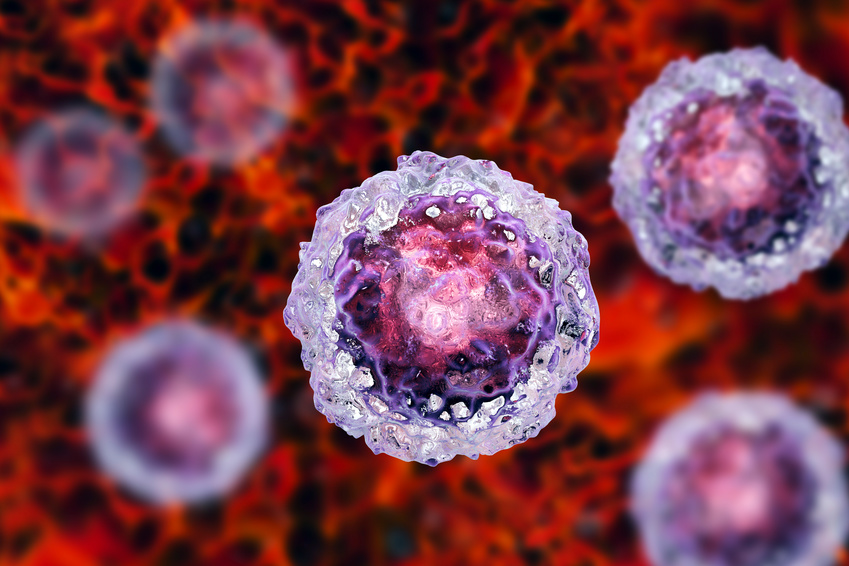
What Are Stem Cells?
Stem cells are naturally occurring “naive” or unspecialized cells that are made by the body known as “Pericytes” that reside on the surface of the body’s blood vessels. Recent research has found that almost all types of body tissues and organs contain adult stem cells that the body keeps on hand in order to supplement, repair or replace damaged tissue.
These adult or somatic stem cells exist throughout the body after embryonic development and are found in almost every different types of tissue, including bone marrow, blood, blood vessels, muscles, skin, nerves, the intestines, ovaries, testes, liver, heart and brain.1 Adult Stem Cells have the ability to transform into and assume the functions of a variety of different cells in the body, including cartilage, bone, muscle, nerve and every organ or specialized tissue in the body.
Perhaps the most important potential application of human stem cells is the generation of cells and tissues that could be used for cell-based therapies. Today, donated Human Umbilical Cord tissue is often used to stimulate and augment the body’s own anti-inflammatory chemicals, balance the immune system and activate the body’s own Stem Cells to supplment, repair or replace ailing or damaged tissue. Adult Stem Cells that are able to differentiate into almost any specific cell type needed and offer the possibility of a renewable source of replacement cells and tissues to treat diseases including macular degeneration, spinal cord injury, strokes, burns, heart disease, diabetes, osteoarthritis, rheumatoid arthritis and other autoimmune diseases.2
This ability to recognize damaged or diseased cells and then change into those precise cells to repair them in a tissue-specific way is the key to the amazing healing benefit of stem cells. When injected into a damaged tissue, stem cells act at “Medicinal Signaling Cells” to direct the supplementation, reconstruction, or replacement of damaged tissue with new healthy cells and tissue and thus have the ability to fully restore optimal function.
Regenerative Medicine can offer what drugs and surgery simply cannot: the natural enhancement of the ability of the body to restore and heal itself.
“This is no longer the stuff of science fiction. We’re at the beginning of a paradigm change in medicine with the promise of being able to facilitate regeneration of parts of the human body, where cells and tissues can be engineered to grow healthy, functional organs to replace diseased ones; new genes can be introduced into the body to combat disease; and adult stem cells can generate replacements for cells that are lost to injury or disease. This is the practical promise of modern applications of regenerative medicine.”
– Scott Gottlieb, MD, Commissioner of the FDA
Does the FDA Regulate the Use of Stem Cells?
On November 17, 2017, the U.S. Food and Drug Administration (FDA) announced a comprehensive policy framework for the development and oversight of regenerative medicine products, including stem cells and novel cellular therapies. This modern framework is intended to balance the agency’s commitment to safety with mechanisms to drive further advances in regenerative medicine so innovators can bring new, effective therapies to patients as quickly and safely as possible.
Where Do Stem Cells Come From?
Stem Cells are derived from four different sources: umbilical cord tissue, embryonic tissue, bone marrow, and adipose tissue. However, embryonic stem cells are prohibited thankfully due to ethical concerns, while bone marrow and adipose tissue stem cells can only be retrieved through invasive surgical procedures. However, Umbilical cord stem cells, are free of these concerns and provide the richest source of Mesenchymal Stem Cells.

The umbilical cord connects the fetus to the placenta. It provides the conduit of nutrients and oxygen for the fetus. The umbilical cord contains two arteries and one vein that are immersed and protected by a connective tissue matrix known as Wharton’s Jelly, which is rich in Adult Stem Cells, fibroblasts, cytokines and other growth factors, hyaluronic acid and immune cells that are purposefully naive so that they are compatible to both baby and mother in order to prevent host tissue rejection. Stem Cells obtained from Umbilical Cord Tissue is the richest and most viable source of Mesenchymal Stem Cells.
Dr. Hansen has chosen to use BioGenix as his premier Stem Cell provider in order to obtain safe, reliable, ethically sound umbilical cord tissue directly from hospitals participating in umbilical cord tissue donation programs. We certify that only umbilical cord tissue from disease free donors, in U.S. hospitals, following a planned healthy birth is used to obtain our Stem Cells. All donors are screened for medications, communicable disease, and physiological conditions and are reviewed by a medical director before the umbilical tissue is minimally processed and prepared for cryopreservation in an FDA registered and fully compliant laboratory.
By choosing to use Adult Stem Cells only from umbilical cord tissue, we harness the medical advantages of the highest concentration of mesenchymal stem cells, anti-inflammatory cytokines and growth factors, while circumventing invasive procedures and providing the highest quality product that aligns with our high standards and ethics.
How Do Stem Cells Work?
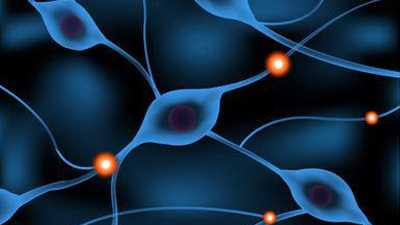
1. Stem Cells Respond to Cell Signaling
When an area of the body is injured or not functioning properly, distress signals are sent through the bloodstream. These signals serve to recruit mesenchymal stem cells to come to the affected area.
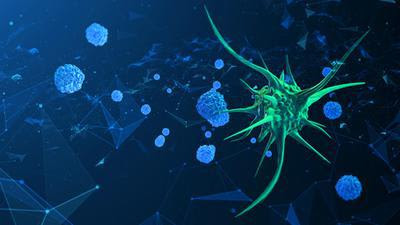
2. Stem Cells Dock on Target Tissue
Once in the affected area, stem cells dock on other cells and begin to produce signalling proteins that work to regulate inflammation, aid in new blood vessel production known as angiogenesis, and promote healthy tissue repair.
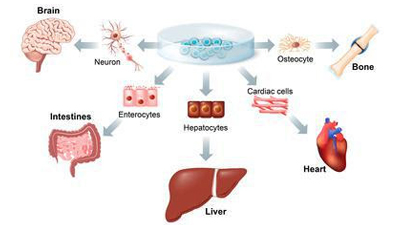
3. Stem Cells Differentiate into Specialized Cells
Stem cells then mature and differentiate, or change into a specific type of cells, including bone, heart, liver, intestine, nerve, and even brain cells. in order to supplement or replace that specific cell type. In this way, they compensate for the cells that are damaged, nonfunctional, or lacking and consequently reduce or eliminate disease symptoms.
“One of the most promising new fields of science and medicine is the area of cell therapies and their use in regenerative medicine. These new technologies, most of which are in early stages of development, hold significant promise for transformative and potentially curative treatments for some of humanity’s most troubling and intractable maladies. The applications of stem cells in regenerative medicine are as diverse as stem cells’ ability for differentiation. While this healthcare technology has made the most headway in orthopedics as an alternative to invasive joint surgeries and in healing non-union bone fractures, it is also breaking ground in the rheumatology, cardiology, neurology, immunology and other areas as well.
– Scott Gottlieb, MD, Commissioner of the FDA
Conditions that may be Benefited by Cellular Therapy
- Osteoarthritis
- Rheumatoid Arthritis
- Auto Immune Disease
- Lupus
- Crohn’s Disease
- Ulcerative Colitis
- Fibromyalgia
- Degenerative Disc Disease
- Bulging/Protruding Discs
- Heart Disease
- Strokes
- Lung Disease/COPD
- Type I and Type II Diabetes
- Neuropathy
- Spinal Cord Injury
- Autism

How Much Does Cellular Therapy Cost?
In the U.S., treatment protocols vary depending on the clinic and the treating physician. A one-time treatment that utilizes a blood specimen drawn from a patient, such as PRP (Platelet Rich Plasma) injections, typically cost between $500 and $1,500. At the Hansen Clinic of Natural Medicine, Dr. Hansen’s patients have had dramatic success with his PRP treatments especially for the treatment of Osteoarthritis of the Knees, Hips and other joints. Dr. Hansen has developed a specific PRP Protocol that includes a series of 10 PRP injections at a total cost of $3950. His patients will tell you that the results are profound, with most patients becoming pain free after the fourth week and by the end of the 10th injection they feel like they have a new joint. Most doctors typically only give 3 injections of PRP, but typically charge $1500 per injection for a total of $4500.
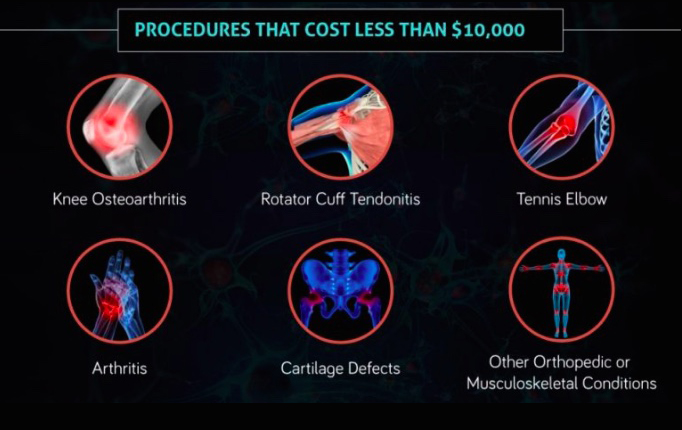
What is the Cost of Stem Cells Therapy for Osteoarthritis?
For orthopedic or joint conditions, the cost of cellular therapy using human umbilical cord tissue typically costs between $5,000 and $8,000 per injection. Note that many physicians only give 1 Million Stem Cells per injection for that price, but Dr. Hansen gives 30 Million Stem Cells per injection for $5900. Examples of medical conditions treated with stem cells from umbilical cord tissue include:
- knee osteoarthritis
- hip osteoarthritis
- shoulder joint arthrits or labral tears
- rotator cuff tendonitis or tears
- arthritis of the back or neck
- degenerative disc disease
- cartilage defects
Note that these costs are typically paid out-of-pocket by the patient because most insurance companies will not cover them. They are still considered investigational and unapproved by the FDA. This means that patients desiring stem cell treatments will need to use their own funds, however, financing is available at Zero % interest for up to 24 months.
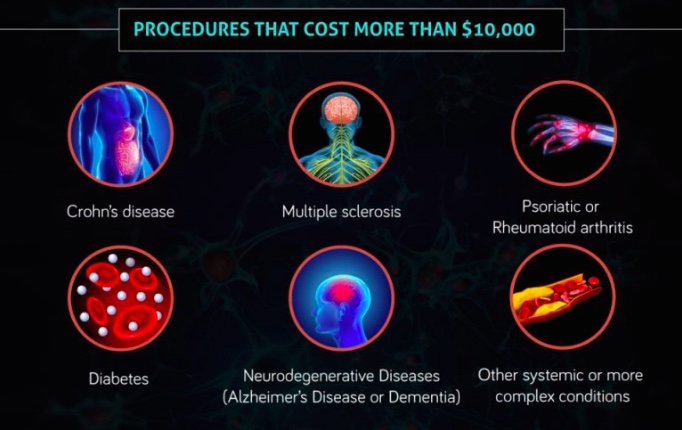
What is the Cost of Cellular Therapy for Systemic Conditions?
Conditions that are systemic in nature require a systemic treatment, such as an IV infusion of Stem Cells. These treatments typically require 2-3 times more stem cells per treatment than other conditions and often a 2nd separate treatment. Costs for these infusions are often as high as $20,000 to $30,000. At the Hansen Clinic, we infuse 30-90 Million Stem Cells depending on the individual patient body weight and medical condition. The cost of 30 Million Stem Cells is $5900; 60 Million Stem Cells Costs $11,800; 90 Million Stem Cells Cost $17,700. However, for a limited time, the Hansen Clinic is able to give a 10% discount for 30 Million Stem Cells and 20% discount for 60 to 90 Million Stem Cells.
Limited Time Special Pricing for Cellular Therapy
- 30 Million Mesenchymal Stem Cells for $5,310
- 60 Million Mesenchymal Stem Cells for $9,440
- 90 Million Mesenchymal Stem Cells for $14,160
Examples of the conditions requiring IV Infusion of stem cell treatment include:
- Auto Immune Disorders
- Crohn’s disease/Ulcerative Colitis
- Multiple Sclerosis (MS)
- Neurodegenerative diseases, like Alzheimer’s disease and Dementia
- Rheumatoid Arthritis
- Lupus
- Psoriasis
- COPD
- Diabetes
For More Information
If you would like to learn more about Cellular Therapy and what it would cost for your specific condition, please call today for a FREE 10 minute consultation with Dr. Hansen!
Call us Today at (480) 991-5092!
Explore Stem Cells Research
Learn how stem cell treatment is creating incredible results in a variety of medical conditions. Read more from BioGenix.
Orthopedics
Osteoarthritis
Arthritis is a condition of the joints that can become debilitating due to pain and decreased range of motion. While manifestations of arthritis differ from patient to patient, the underlying cause is chronic systemic inflammation. Mesenchymal stem cells are anti-inflammatory, allowing them to reduce the impact of arthritis. Studies that used stem cells to treat knee osteoarthritis have found the treatment to help patients to walk longer and climb more stairs, and have observed long-term improvement at 5-year follow-up, compared to baseline.
Joint Injury
The tissue regenerative properties of stem cells make them a unique tool for repairing cartilage after injury, serving as an alternative to surgery. Stem cells’ action on cartilage can reduce pain and improve joint function for patients who have suffered joint injuries.
Bone Fractures
In the human body, stem cells participate in bone healing after a fracture. Harnessing their osteogenic properties, stem cell treatment can aid in bone union to improve fracture recovery.
Rheumatoid Arthritis
Human Umbilical Mesenchymal Stem Cells (MSCs) given to Active Rheumatoid Arthritis patients provides safe, significant and persistent clinical benefits
Cardiology
Heart Disease
In heart disease, a narrowing of the blood vessels that carry blood to the heart results in reduced delivery of oxygen and consequently, injury to the heart tissue. Stem cells have the ability to differentiate to regenerate heart muscle tissue that has been damaged by cardiovascular disease. In a clinical trial that applied stem cells in the case of ischemic cardiomyopathy, the treatment improved patient functional capacity and quality of life.
Neurology
Parkinson’s Disease
Patients who suffer from Parkinson’s Disease develop difficulties with motor skills due to a progressive reduction in the production of the neurotransmitter dopamine. Mesenchymal stem cells that differentiate to become dopamine secreting cells in the brain have an ability to reverse this decline and produce an improvement in motor skills.
Immunology
Autoimmune Disorders
Autoimmune diseases like multiple sclerosis, rheumatoid arthritis, and lupus occur when a person’s immune system attacks the body’s cells as if they were foreign. Stem cell treatment introduces functional immune system cells and can improve the balance of TH1 and TH2 cytokines. In fact, it has been shown to produce remission in lupus patients.
Dr. Clark Hansen, N.M.D., has been voted one of Arizona’s Top Doctors multiple years in a row. He has been in practice for more than 30 years and has trained extensively in Europe with the leading experts from around the world.
Disclaimer:
This information is intended for educational purposes only. It does not seek to make claims about the effectiveness of stem cells in medical treatment.
Stem cell therapies have great potential in treating a range of chronic conditions. This site serves to inform medical professionals about stem cell regenerative medicine, the BioGenix stem cell product, and key in vitro, animal model, and clinical research studies that have been carried out to date across medical specialties and health conditions. However, stem cell medicine is an early and evolving field, and clinical studies are still insufficient to determine effectiveness.
While the BioGenix umbilical cord mesenchymal stem cell product is produced in an FDA compliant laboratory, it has not been approved by the FDA for treatment effectiveness. The FDA states:
“Stem cells, like other medical products that are intended to treat, cure or prevent disease, generally require FDA approval before they can be marketed. FDA has not approved any stem cell-based products for use, other than cord blood-derived hematopoietic progenitor cells (blood forming stem cells) for certain indications.”
References
- Stem Cell Basics IV.stemcells.nih.gov h
ttps://stemcells.nih.gov/info/ basics/4.htm - Stem Cell Basics VII.stemcells.nih.gov
https://stemcells.nih.gov/ info/basics/7.htm - FDA News Release: FDA announces comprehensive regenerative medicine policy; https://www.fda.gov/
NewsEvents/Newsroom/ PressAnnouncements/ucm585345. htm - BioInformant Research Blog: https://bioinformant.
com/cost-of-stem-cell-therapy/

